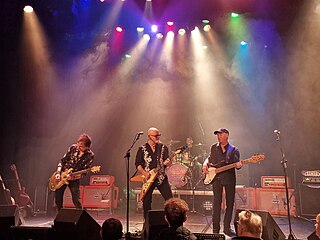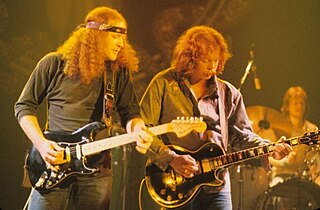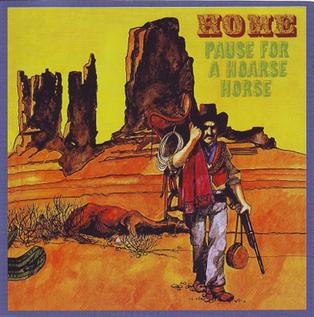
Big Audio Dynamite were an English band, formed in London in 1984 by Mick Jones, former lead guitarist and co-lead vocalist of the Clash. The band mixed various musical styles, incorporating elements of punk rock, dance music, hip hop, reggae, and funk. After releasing a number of well-received studio albums and touring extensively throughout the 1980s and 1990s, Big Audio Dynamite broke up in 1997. In 2011, the band embarked on a reunion tour.

The Rubettes are an English pop/glam rock band put together in 1974 after the release of "Sugar Baby Love", a recording assembled of studio session musicians in 1973 by the songwriting team of Wayne Bickerton, the then head of A&R at Polydor Records, and his co-songwriter, Tony Waddington after their doo-wop and 1950s American pop-influenced songs had been rejected by a number of existing acts. Waddington paired the group with manager John Morris, the husband of singer Clodagh Rodgers and under his guidance, the band duly emerged at the tail end of the glam rock movement, wearing trademark white suits and cloth caps on stage. Their first release, "Sugar Baby Love" was an instant hit remaining at number one in the United Kingdom for four weeks in May 1974, while reaching number 37 on the US chart that August, and remains their best-known record. Subsequent releases were to be less successful, but the band continued to tour well into the 2000s with two line-ups in existence.

Wishbone Ash are a British rock band who achieved success in the early to mid-1970s. Their albums include Wishbone Ash (1970), Pilgrimage (1971), Argus (1972), Wishbone Four (1973), There's the Rub (1974), and New England (1976).

Bad Company were an English rock supergroup that was formed in London in 1973 by singer Paul Rodgers, drummer Simon Kirke, guitarist Mick Ralphs and bassist Boz Burrell. Kirke was the only member to remain throughout the band's entire run, while he and Ralphs were the only members to appear on every studio album. Peter Grant, who managed the rock band Led Zeppelin, also managed Bad Company until 1982.

Black Oak Arkansas is an American Southern rock band named after the band's hometown of Black Oak, Arkansas. The band reached the height of its fame in the 1970s, charting ten albums. Their style is punctuated by multiple guitar players and the raspy voice and on-stage antics of vocalist Jim "Dandy" Mangrum.

Outlaws is an American Southern rock band from Tampa, Florida. They are best known for their 1975 hit "There Goes Another Love Song" and extended guitar jam "Green Grass and High Tides" from their 1975 debut album, plus their 1980 cover of the Stan Jones classic "(Ghost) Riders in the Sky".

Clifford Williams is an English musician, best known as the bassist and backing vocalist of the Australian hard rock band AC/DC. He started his professional music career in 1967 and had previously been in the English groups Home and Bandit. His first studio album with AC/DC was Powerage in 1978. Williams was inducted into the American Rock and Roll Hall of Fame as a member of AC/DC in 2003. Williams announced his retirement from AC/DC in 2016, but returned for their 2020 comeback album Power Up along with band mates Brian Johnson and Phil Rudd. His side projects include benefit concerts.

Fraternity were an Australian rock band that formed in Sydney in 1970 and relocated to Adelaide in 1971. Former members include successive lead vocalists Bon Scott, John Swan, and his brother Jimmy Barnes. Their biggest local hit was a cover version of "Seasons of Change", which peaked at No. 1 in Adelaide, but nationally it was overrun by the original Blackfeather version. The group won the 1971 Hoadley's Battle of the Sounds with the prize being a free trip to London. Fraternity went through various line-ups and was renamed as Fang, Fraternity (again). In the late 70s some Fraternity former members created the bands Some Dream and Mickey Finn. Mickey Finn disbanded in 1992.

Wishbone Four is the fourth studio album by British rock band Wishbone Ash, released in 1973. It was a departure from their previous album, Argus, in that it lacked that recording's overall cohesion and atmosphere and the loose conceptual framework of a stately, pastoral and warring medieval England. Containing only hints of the extended twin-lead guitar harmonies, Wishbone Four's stylistic variety found its footing in acoustic folk elements in half of the eight-song set, two aggressive and melodic starters on each side of the vinyl release, and the band's first use of horns on the semi-autobiographical "rave-up" touring song "No Easy Road".

Locked In is the sixth studio album by the rock band Wishbone Ash, and their second with guitarist Laurie Wisefield who had joined the band in 1974. The album peaked at No. 36 in the UK Albums Chart in April 1976, their lowest UK chart placing to date. It was also the first Wishbone Ash album to feature original tracks not credited to the whole group with four of the tracks credited to either one or two members. The album is considered by many – critics, fans and the band themselves – to be one of the weaker entries in their extensive catalog. The band frequently place the blame on producer Tom Dowd, who insisted the band play much quieter in the studio, removing much of the energy of their performances. The band had switched U.S. distribution from MCA Records to Atlantic Records for this and the next release, New England.

Front Page News is the eighth album by rock band Wishbone Ash. It peaked at No. 31 in the UK Albums Chart.

Number the Brave is the 11th studio album by rock band Wishbone Ash. It is the first album in the band's history recorded without founding bassist/vocalist Martin Turner. Turner was replaced by John Wetton, formerly of King Crimson and Uriah Heep. Also featured on Number the Brave was singer Claire Hamill as a backing vocalist, who would join Wishbone Ash on the 1981 tour to promote the album. Following "Vas Dis" on Pilgrimage and "Helpless" on Just Testing, the album featured only the third cover version released by the band on a studio album, Smokey Robinson's "Get Ready", previously a hit for The Temptations.

Twin Barrels Burning is the twelfth studio album by British rock band Wishbone Ash. It was recorded at Sol Studios and released in 1982. It was the highest charting Wishbone Ash album since 1976, reaching No. 22 in the UK Albums Chart. Conversely, it was the final album to appear in that listing to date.

Ian Hunter Patterson is an English singer, songwriter and musician. He is best known as the lead vocalist of the rock band Mott the Hoople, from its inception in 1969 to its dissolution in 1974, and at the time of its 2009, 2013, and 2019 reunions. Hunter was a musician and songwriter before joining Mott the Hoople, and continued in this vein after he left the band. He embarked on a solo career despite ill health and disillusionment with commercial success, and often worked in collaboration with Mick Ronson, David Bowie's sideman and arranger from The Rise and Fall of Ziggy Stardust and the Spiders from Mars period.
Home were a British progressive rock band, active in the early 1970s.
Cliff Bennett and the Rebel Rousers were a 1960s British rhythm and blues, soul and beat group who had two top 10 hits with "One Way Love" and "Got to Get You into My Life".
Laurence Mark Wisefield is an English guitarist and vocalist, best known for his contributions to Wishbone Ash during the 1970s and 1980s.
Fusion Orchestra was a British progressive rock band active between 1969 and 1975.

Pause for a Hoarse Horse is the debut album of British rock band Home. The record was released in 1971 by CBS Records. The band's line-up consisted of Cliff Williams on bass, Laurie Wisefield on guitar, Mick Cook on drums and Mick Stubbs on guitar. It also featured keyboardist Clive John. The album did not make much headway and was one of only three albums released by the group from 1971 to 1973.

Home is the second album by UK rock band Home. It was released in 1972 by CBS Records.
















